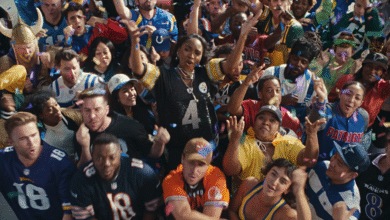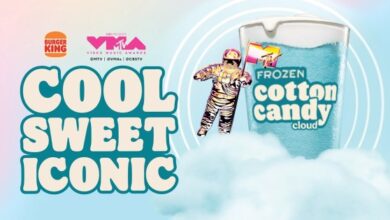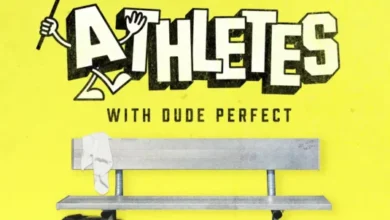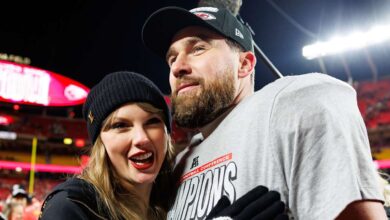Inside the booth with Bob Papa and Carl Banks: A behind-the-scenes look at all that goes into a Giants broadcast
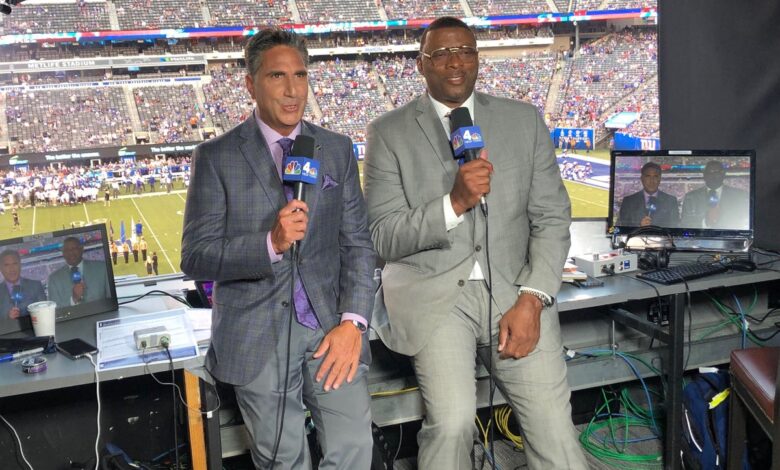
The beginning of Bob Papa and Carl Banks’ broadcasting partnership in the 1980s wasn’t glamorous.
“He had some deal with Diet Coke, so we had to do the ‘Carl Banks Diet Coke Report’ twice a week,” Papa said. “My job was to record it and do the interview with him. In the old stadium, we would do it in his car, we did it in the officials’ bathroom – we did it every quiet place we could find.”
A chemistry was formed in the various pockets of Giants Stadium between Papa, then a burgeoning broadcaster fresh out of Fordham, and Banks, a star linebacker for a pair of Super Bowl winners. They eventually reunited in the Giants radio booth, with Papa hired as the play-by-play announcer in 1995 and Banks joining as a full-time color analyst in 2007.
As they embark on their 13th season as the Giants’ radio team, The Athletic followed Papa for a behind-the-scenes view of the broadcast of Friday’s preseason game against the Bears.
3:42 p.m.: Papa arrives at the loading dock entrance to MetLife Stadium wearing a backpack and carrying a patterned purple tie from Saks Fifth Avenue. A self-described “early-arrival guy,” Papa likes to be in the stadium four hours before kickoff. But he’s running a few minutes late after battling traffic on the commute from his new home in Weehawken, N.J.
This is Papa’s second trip of the day to the Meadowlands. He was across the parking lot in the Giants’ facility at 6:30 a.m. to record “The Opening Drive,” the daily football talk show he has hosted on SiriusXM Radio since 2004.
When that show wrapped at 11 a.m., Papa went directly into a production meeting with coach Pat Shurmur in the Giants’ defensive meeting room to prepare for the television broadcast on NBC New York. The radio team shifts to television every summer since franchises are responsible for producing preseason games locally.
Papa was joined by Banks and longtime sideline reporter Howard Cross, as well as the fill-in radio team and the producers of the broadcasts. While national TV announcing teams get extensive production meetings with Shurmur and key players the day before regular season games, the radio team doesn’t have formal sit-downs during the season.
“I’m here every day,” Papa says. “I see anybody I need to see. I have access to every player. Carl has the same access as a former player. So we don’t really need a production meeting.”
Shurmur is more open during the 20-minute meeting than during his daily news conferences, providing background information on the team’s thinking that helps shape the broadcast.
3:56 p.m.: After checking in with the crew in the production truck, Papa enters the stadium and takes the elevator to the third floor. He walks past the luxury suites to the national TV broadcast booth, which will be his office for the next seven hours. The open-air booth features a table full of snacks – cookies, bananas, granola bars, almonds, sparkling water and coffee – and a private bathroom, which is a major perk. Papa’s typical home, the radio booth, is two floors up on the main press box level. Papa says that he usually hands off the broadcast to halftime show host Lance Medow, rips off his headset and sprints to the bathroom to beat the lines.
The Giants split the national booth in half for the preseason games, with the Bears television broadcast team on the other side of a temporary wall. Papa points out that the Giants are unusually broadcast-friendly, as he laments how luxury suites in new stadiums have pushed booths farther from the prime midfield real estate they enjoy at MetLife Stadium.
“As the stadiums have gotten better and nicer and newer, your vantage point is getting put in a lot worse positions, which is a gripe I have with the league,” Papa says. “Home and visiting radio need to be afforded some better positions than they’re putting us in because you’re trying to call a game from the back corner of an end zone. It’s impossible.”
As Papa settles in, he notices a problem: A piece of the makeshift wall separating the broadcast crews is missing. Papa is friendly with Bears announcers Adam Amin and Jim Miller, but they don’t want to be talking over each other during the game. A text message sends stadium workers scrambling to address the issue.
4:02 p.m.: There’s more prep work involved for TV since there are pre-produced packages that run during the broadcast. Papa quickly reads through the dozen sheets he received in the production truck to get familiar with the copy. Meanwhile, the Giants’ drum line rehearses on the field, Bears staffers stock their bench area with Gatorade and a groundskeeper tends to the turf along the sideline with a leaf blower.
Papa, 54, has plenty of television experience. Most notably, he has called boxing for ESPN and HBO, worked 11 Olympics for NBC and was the play-by-play voice for the NFL Network’s “Thursday Night Football” from 2008-10.
Papa’s other announcing duties have caused him to miss a handful of Giants radio broadcasts through the years. He called the Giants-Broncos game on Thanksgiving night in 2009 for NFL Network and he missed some regular season games while covering the 2000 Summer Olympics in Sydney.
As his national profile grew, it was important for Papa to maintain his role with the Giants. Papa’s mentor Marty Glickman, the late sportscasting legend, stressed the value of preserving local roots in the New York market.
Papa considers the Giants his “ultimate priority,” currently balancing that with his role as a play-by-play host for Golf Channel.
“When I left HBO and went to Golf Channel (in 2012), it was kind of written in my contract that Golf Channel basically has me from when the Giants’ season ends until the Giants play their first preseason game,” Papa says. “And if I can work any golf in and around it, great.”
There’s no such thing as an offseason for Papa. He’s traveled 100,000 air miles in the eight months since the Giants’ season ended.
4:13 p.m.: Papa unloads a pouch full of pens and highlighters as he shifts his attention to finishing his depth chart cards. The cards are typically done by Tuesday night during the regular season, but he was set back by his move this week. And it’s a longer process in the preseason with 90 players on each roster.
The cards provide the information Papa will reference throughout the broadcast. He’s devised his own color-coded system so he can quickly drop a pertinent nugget about every player. He painstakingly handwrites each piece of information in pristine penmanship.
“Some guys do it on the computer, but for me, writing it out by hand in the different colors, I barely need to look at it come game day,” Papa says. “Or if I do need it, I know what it is.”
Red ink is for the players’ numbers, any superlatives (i.e. Pro Bowl selections) and the longest plays of their careers. Blue ink is for players’ names and how they entered the league. Black is for measurables and biographical information (college, age, experience, how they were acquired by the Giants). Green ink is for local players, with their hometown and high school noted.
“I learned from Marty Glickman that a guy could be playing for another team but he was born and raised here and his family is here,” Papa says. “People love hearing their hometown said on the air. Some Giants fan is listening and says, ‘Hey, that’s my town!’ It kind of catches the listener’s ear.”
The names are grouped by position and arranged in their order on the depth chart. Papa updates the stats for Giants players in pencil during the week and covers the spots of players who get released. He considers Wite-Out tape the greatest invention for play-by-play announcers, since he no longer needs to use paste when editing his cards. The pages are clipped to a manila folder, with the Giants offense and opposing defense on one side and the Giants defense and opposing offense on the other.
Papa aims to have a nugget on each player from the opposing team, so he fires up his MacBook Pro to cull from the Bears’ digital media guide. He bemoans how teams have shifted away from hard copy media guides, which are easier to flip through quickly without fear of a computer freezing.
Papa has more notes for a regular season game, using another open manila folder with one side for each team. These notes pertain more to historical elements, like the series history between the teams and individual milestones.
“It’s everything you would see in graphics on TV, but because it’s radio you have to actually say it,” Papa says. “You use maybe 30 percent of it, but you never know when you’re going to need something, so it’s right there.”
Papa keeps the cards for each opponent in a filing cabinet at home, but has become less of a hoarder. Whereas he used to keep the scorecard from every boxing fight he called, he now cycles his old notecards out each time the Giants play a team. For instance, he’ll throw away his Bills card from the 2015 season after the Giants face them in Week 2 this season.
5:24 p.m.: Papa has spent the past hour filling out his Bears notes before taking a break to have his makeup applied. The booth starts to grow crowded as a handful of staffers arrive to record a “Keys to the Game” segment that will air on the stadium video boards before kickoff.
5:31 p.m.: Banks arrives and immediately has his makeup applied. The makeup artist will remain in the booth for the rest of the night in case the announcers need a touch up.
As Papa finishes his notes – the process likely would have gone quicker if he wasn’t interrupted frequently with questions from an interloper – Banks slips out of the booth.
The third of Papa’s four sons, Nicholas, calls from the field. Nicholas serves as his father’s statistician during the season and will be working with the radio team tonight. He comes up to the TV booth and tells his father that he’s been moved from the slot to outside receiver as he prepares for his senior season on the Chatham (N.J.) High football team. Soon after, Papa’s second oldest son, Will, drops by the booth. Will used to be his father’s statistician, but he’s not around in the fall since he’s headed back to Marist to begin his sophomore year this week.
Papa’s four sons – Christopher, 21; Will, 19; Nicholas, 17; and Max, 4 – were all born in the offseason. Aside from the rare conflicts with his national gigs, Papa has never missed a Giants broadcast in 24 seasons for a life-related event.
Papa invariably gets rundown when the weather starts to change in the fall, but he uses every remedy possible to have his voice ready for Sunday. That means spending as much time in “silent mode” as he can and “drinking every Bigelow Green Tea possible.”
There have been a few close calls with travel. Papa called a boxing match in Las Vegas the night before a preseason game in Baltimore one year. He was scheduled to take a redeye to Newark and then head to Baltimore, but his flight was canceled due to storms on the East Coast.
Papa was put on standby for one of the only redeyes departing Vegas for Newark. He was 12th on the standby line, so he knew his odds of getting on the flight were slim. He sized up the people ahead of him on the list and spotted a man in Plaxico Burress Giants jersey. After some negotiating, the Giants fan came away with Papa’s four tickets to the regular season opener, Papa’s parking pass for the game and some cash. In exchange, Papa got on the flight and didn’t miss the broadcast.
Papa had season tickets in the upper deck of Giants Stadium. He bought PSLs for four season tickets in section 116 in MetLife Stadium, but he obviously has never watched a game from the seats. He figured his sons would use the tickets, but they prefer to help in the booth at games. So Papa mostly donates the tickets to charity. He also gets two season tickets in section 120 as part of the five-year contract he re-signed with the Giants in March.
5:50 p.m.: As the crew grows increasingly anxious, Papa is asked to locate his partner. He sends a text to Banks but doesn’t get a reply. After a few minutes pass, an editor leaves the booth to search for Banks.
6:02 p.m.: Banks returns to the booth, seemingly unaware of the angst about his disappearance. He explains that was having dinner with Don Sperling, the vice president of Giants Entertainment.
“Like everything else, I know the timing of it,” Banks says. “By the time (Papa’s) text came, I was already walking through the door.”
6:05 p.m.: Papa and Banks record the “Keys to the Game,” nailing the 90-second segment without huddling beforehand. The Papa clan heads to the field, with his sons revealing their initial skepticism of the Giants’ selection of quarterback Daniel Jones with the sixth overall pick in April. (Nicholas preferred Kentucky linebacker Josh Allen).
6:16 p.m.: The Papas arrive on the field. They immediately head to midfield to catch up with Bears tight ends coach Kevin Gilbride, the son of the former Giants offensive coordinator. Papa fondly recalls the younger Gilbride, who was a Giants assistant from 2010-17, putting Will through workouts on the field before games and allowing him to run routes against Giants defensive backs.
After chatting with Gilbride for a few minutes, Papa seeks out Bears cornerback Prince Amukamara, who spent the first five seasons of his career with the Giants. Papa calls Amukamara one of the most unique players he has encountered. He shares a story of how the amiable cornerback, undeterred by a steady diet of trash talk coming his way, reached across the line to shake the hand of Dez Bryant and express his admiration for the former Cowboys receiver the first time they matched up.
Papa has connections around the league through his Sirius show and from relationships with the many coaches who have come through the Giants in his 31 years with the organization. Pregame warmups are an invaluable time to utilize those relationships to gather information.
“I learned pretty quickly that you get your best information on the field before the game,” Papa says. “You always see people BS-ing out in the middle of the field and you get some good stuff from coaches and opposing coaches and opposing players that you know. It’s amazing the little snippets that people will tell you. ‘Oh, that guy’s playing like garbage’ or ‘We can’t stop this.’”
6:41 p.m.: After chatting with Sperling and former Giants offensive lineman Shaun O’Hara, who is subbing for Banks on the radio broadcast, Papa heads back to the booth.
Papa snacks on almonds but doesn’t eat a meal after he gets to the stadium because it “weighs you down.” Papa and Banks discuss how quarterback Eli Manning’s 2018 stats compare favorably to those of Bears quarterback Mitch Trubisky, who was selected for the Pro Bowl. Banks calls for more powder as Papa bobs to the stadium music.
7:02 p.m.: Papa and Banks rehearse the opening to the broadcast. Banks adopts “Sunday Night Football” analyst Cris Collinsworth’s famous “slide-in” when introduced by Papa during rehearsal.
The booth is now full of the people that will make the broadcast run. Joining Papa and Banks at the front of the booth are statistician Ed Sfida and spotter Jim Stamos. Sfida, who is the statistician for FOX’s Joe Buck during the season, is responsible for tracking yardage and passing along statistical notes to Papa. Stamos, who worked with Papa at NFL Network and is now Ian Eagle’s statistician for CBS broadcasts, is a backup set of eyes, identifying players for Papa.

Papa said a spotter isn’t necessary during radio broadcasts since he’s so familiar with the teams from his preparation, which includes studying the same film cut-ups the coaches and players get during the week.
“I know the teams,” Papa says. “If the Giants are playing the Vikings and mistakenly the Patriots showed up or mistakenly the Bucs showed up, I could do that game because I’m immersed in it because of Sirius every day.”
Also in the booth is a stage manager, who serves as the conduit to the producer; a cameraman; the makeup artist; a production runner, who offers general assistance and has indispensable knowledge, such as Papa’s preference for black coffee; and an audio assistant, who is responsible for setting up the microphones and earpieces.
7:07 p.m.: Papa packs a pinch of Skoal berry blend into his lip. A few minutes later, he tweets a photo of himself and Banks from rehearsal that serves as an alert to his 160,000 followers of the broadcast and promotes his sponsorship with Saks.
7:20 p.m.: The “Keys to the Game” segment airs on the video boards.
7:30 p.m.: As the broadcast’s opening package rolls, Papa and Banks clink their microphones.
FIRST QUARTER
Banks takes a seat on the right side of the booth, while Papa, Stamos and Sfida stand to his left as the action begins. When Giants running back Rod Smith breaks a long run on the third play of the game, Sfida writes “17” on a small dry-erase board and holds it up so Papa can announce the yardage gained. Meanwhile, Stamos indicates the tackler by pointing to the player’s name on Papa’s depth chart.
Papa weaves in nuggets from his notecards. Stamos is clearly impressed when Papa references Bears coach Matt Nagy’s stint as quarterback for the Georgia Force in the Arena Football League. Later, Papa is sure to point out that Bears right tackle Rashaad Coward hails from Brooklyn. Nagy has rested all of his starters and Papa adds insight into the decision gleaned from his pregame conversation with Amukamara.
The game is airing nationally on the NFL Network and Papa fields a text from 49ers kicker Robbie Gould, who has tuned in to watch two of his former teams.
“Manning underneath … completes it … Fowler’s in for the touchdown!”
Papa adds some inflection but doesn’t go overboard in his call of Manning’s 8-yard touchdown pass to Bennie Fowler on the opening possession.
On the next possession, Banks uses the telestrator to show how Bears running back Ryan Nall got outside to pick up a first down on a third-and-1 carry. In addition to the telestrator, each announcer and Stamos have monitors showing the broadcast while Sfida tracks live stats on his computer.
Papa and Banks spend most of the breaks scrolling their phones. Banks even fires back at a troll on Twitter during the third quarter.
because you’re too useless to qualify.
— Carl Banks (@CarlBanksGIII) August 17, 2019
The announcers’ eyes are always fixed on the field, so they rarely look at each other while they’re talking, but they never step on each other’s toes.
“In radio, you have really defined roles,” Papa says. “Carl knows the play happens, I give who caught it, who made the tackle and then it’s his canvas until they break the huddle and then I have to give the formation and everything because you’re the camera on radio.”
The roles are less defined on television where the images can tell the story, but Papa and Banks make the transition seamlessly each preseason.
“Bob is someone I’m really grateful for because he’s really taught me the ins and outs of it,” Banks says. “I kind of understood what I wanted to do and how I wanted to articulate it, but the cadence and the timing of it, I owe it all to him. Every Thanksgiving I send him a thank you for that because we wouldn’t be this team and I certainly wouldn’t be where I am without him.”
Papa credits Banks for increasing his football acumen.
“We know each other’s yin and yang,” Papa says. “I learn a lot from him because his football IQ is off the charts. He just knows what he’s looking at. He’s got so many contacts within the league with other teams. He can reach out to people and find out what they’re doing so he understands it.”
SECOND QUARTER
As the Giants’ second-string offensive line enters the game early in the second quarter, Papa shares a note from the production meeting. Shurmur considers second-year offensive lineman Nick Gates a “five-hole player.” Banks explains that means Gates can play all five positions on the offensive line, which is a valuable asset for a player vying for a roster spot.
“Jones has it knocked away … (Stamos points to No. 46 on Papa’s card) by James Vaughters … and he recovers the fumble.”
Jones is having another strong night throwing the ball, but his performance is marred by a pair of fumbles. Papa and Banks point out the rookie’s lack of ball security on the strip-sack by Vaughters.
Banks was asked how he walks the line of being critical of the team while keeping in mind who signs his paycheck.
“I don’t,” Banks says. “I just don’t make it personal. I played the game for a group of coaches that stressed accountability, so we try to be critical. If you can’t give a fan a true description of what’s going on then I think it’s a disservice.”
Papa, who worked for the Nets in a variety of roles from 1989-2001, understands that not all teams give their announcers as much leeway. But he learned early in his time with the Giants that the organization was tolerant of objective criticism.
Papa tells a story from the 1991 season when he was highly critical of the team’s performance while hosting the postgame show. The next day, he saw Wellington Mara in the locker room and the late owner summoned the young broadcaster.
“He says to me, ‘Ann and I listened to the entire postgame show and you were pretty rough on the ball club yesterday. However, what you said wasn’t mean, it wasn’t personal and our fans know when there’s bad football, and there’s nothing wrong with being honest. Just never get personal,’” Papa says. “I think, as history has proven, we have the most critical radio broadcast maybe of any team in New York, and by far in the NFL.”
NBC 4 New York sports anchor Bruce Beck is conducting interviews with players during the action – it’s the preseason after all – but Papa has to interrupt a sideline discussion with linebacker Alec Ogletree to announce Jones’ touchdown pass to T.J. Jones late in the second quarter.
Papa and Banks leisurely head to the private bathroom in the back of the booth during halftime. Papa remarks that the broadcast is “organized chaos,” but everything appears to be running smoothly to the untrained eye. The announcers are back on camera with 1:30 left in halftime to break down the first half.
THIRD QUARTER
Throughout the broadcast, Papa is handed sheets by the stage manager with the prepared copy he rehearsed earlier. After reading one, Papa balls up the paper and sends a hook shot at Sfida. The Bronx native checks the Yankees score during one break, expressing disbelief that they failed to score a run after loading the bases with no outs in the seventh inning of an eventual 3-2 win over the Indians.
There isn’t much chit-chat between Papa and Banks during breaks. But during one stoppage, Banks tells a story about one of his former teammates having a rough game after a rough Saturday night (the player will remain nameless, but it’s not the obvious candidate you’re most likely imagining).
Papa asks Banks if he wants to take the lead coming out of a commercial, so the color analyst greets the audience after a break by highlighting the hustle play by Giants receiver Alonzo Russell to chase down Bears cornerback Clifton Duck after an interception.
FOURTH QUARTER
Having always been impressed with how quickly announcers can calculate the distance of a punt, I ask Stamos if there’s a secret formula. It turns out you just need to be able to do basic math really fast. When Chicago’s Pat O’Donnell punts from his 42-yard line and the ball is fair-caught by Da’Mari Scott at the Giants’ 19, Sfida immediately scribbles “39” on the dry-erase board. Stamos says you just add the two yard lines (42+19=61) and subtract that number from 100 (100-61=39).
Papa jokes about the “dog days of preseason football” midway through the fourth quarter as future teachers face off against future car salesmen. As he reads the out-of-town scores, the Bucs and Dolphins are tied at 6 in the fourth quarter and Papa quips that they’re praying for no overtime. Papa knows the pain of an extended preseason broadcast after the Giants’ opener a week ago had a 59-minute weather delay in the first quarter.
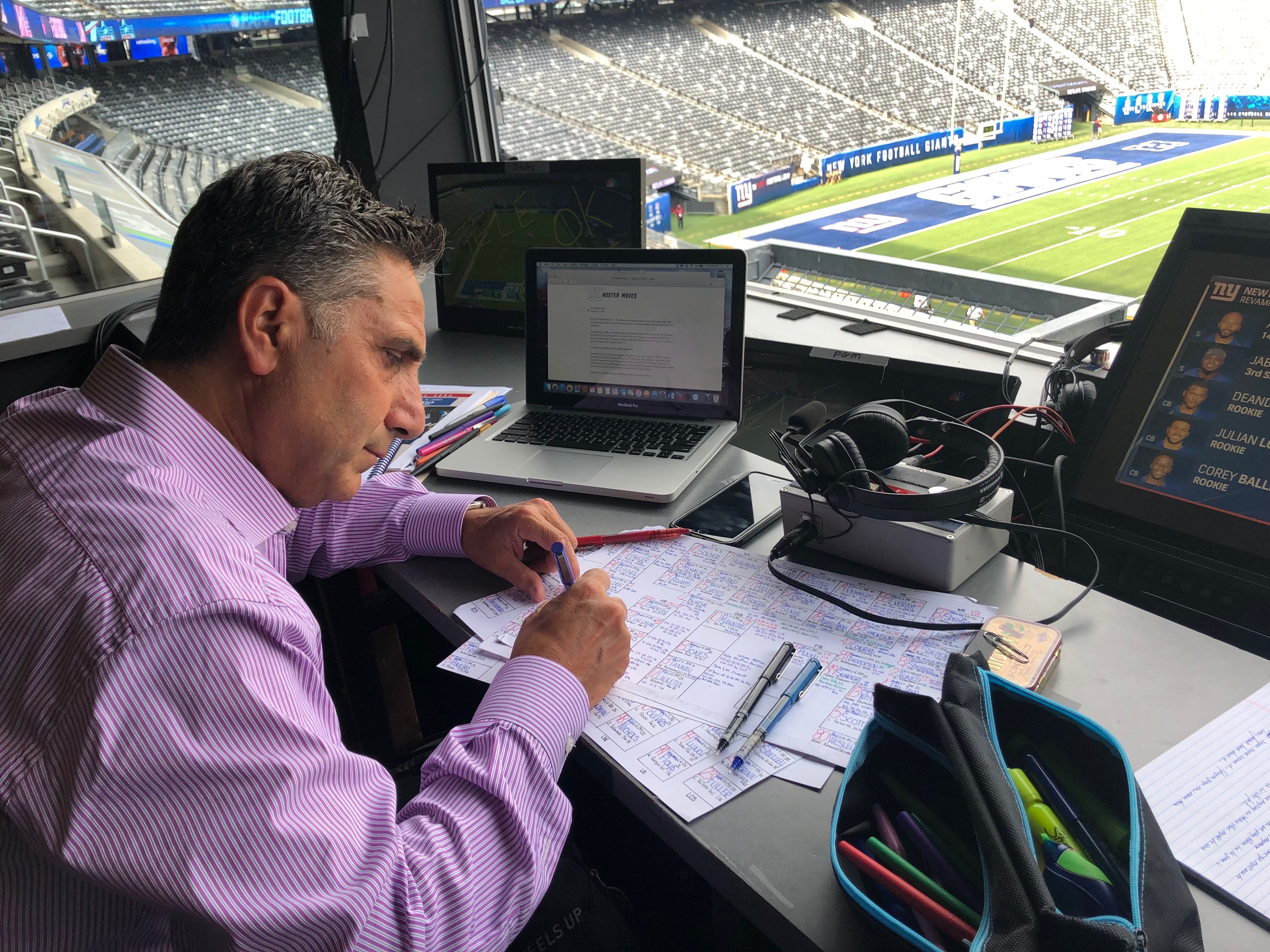
Papa digs into his pregame research. (Photo: Dan Duggan)
A Golf Channel promo allows Papa to work his impression of Spanish golfer Miguel Angel Jimenez into the Giants broadcast, which was an opportunity he couldn’t resist.
As the clock hits 0:00, Banks puts on his suit jacket and the duo stands for an on-camera recap of the Giants’ 32-13 win.
10:41 p.m.: “So long from MetLife Stadium.”
Papa signs off and the makeup artist returns to hand the announcers pads to remove the foundation and powder from their faces. They pack their bags and are out of the booth seven minutes later.
It’s a far more relaxed departure than usual. After a regular season game, Papa is immediately escorted by security to a waiting elevator that takes him to the MetLife plaza inside the stadium. Within two minutes of the final gun, Papa is on set and wired up. He hosts the hourlong postgame show for MSG Network before heading back upstairs to host a call-in show on WFAN for 30-40 minutes. The postgame show is a full-circle assignment for Papa, who got his start with the Giants when he launched the “Giants Point After” in 1988.
10:53 p.m.: Papa typically exits the stadium two hours after a regular season game ends. But with no postgame hosting duties in the preseason, he’s able to meet up with the crew outside the production truck. Putting aside his exasperation over pineapple being one of the toppings among the pizza boxes stacked on a table outside the production truck, Papa grabs a slice of pepperoni and unwinds.
11:10 p.m.: Papa heads out of the stadium through the loading dock. Awaiting is a rarity: A weekend off.
(Top photo of Papa and Banks: Dan Duggan)

